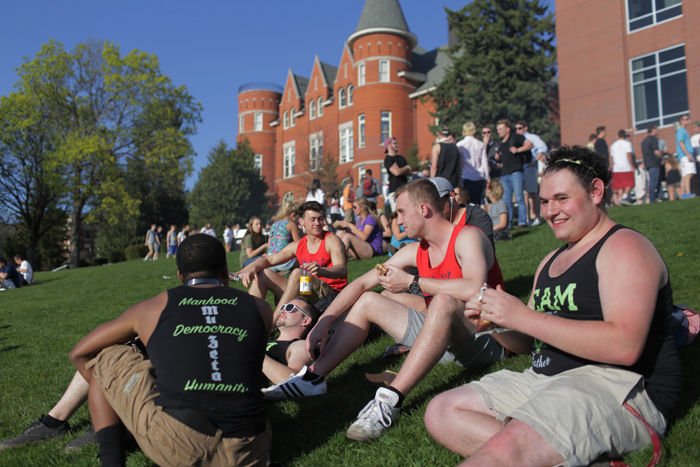Going Greek might just get you going bankrupt
August 30, 2016
If there’s one thing all college students can agree on, it’s that attending a university is expensive.
According to the WSU Budget Office, in-state undergraduate students will pay a total of $9,884 in tuition for the 2016-2017 academic year, with out-of-state undergraduates paying $24,516.
In addition, WSU Admissions estimates that students pay an average of $6,872 for housing and $4,002 for dining per year.
Getting involved can be an even prettier penny, with club dues, transportation costs and your most precious resource – time – being expended.
However, close to a quarter of WSU students find themselves willingly offering up their time and money to join Greek organizations.
About one third of WSU freshmen will take part in Greek recruitment. Long have these organizations touted their ability to retain students at our university and maintain a higher GPA than the average student.
The WSU Center for Fraternity and Sorority Life (CFSL) reports that in Fall 2015, Greek-affiliated students had an average GPA of 3.04 compared to the all-campus GPA of 2.92.
That sounds like a sweet deal. But how much does it cost to join one of these organizations?
According to the CFSL, living in a residence hall and joining a fraternity costs an average of $443 in the fall, and in the spring an average of $628. Sororities can be even pricier, with the average cost to live-out at $1,330.
If you want to live in the house, it costs an average of $4,798 per semester.
Nicholas Hudson, assistant director of CFSL, said most students would absolutely benefit from being in a Greek organization and these organizations have ways of helping students who are worried about the cost.
“Cost isn’t prohibitive, it’s far from it,” Hudson said. “We view fraternities and sororities as graduation tools that help students find their place at WSU.”
But the fact remains that most students don’t have that kind of money out of pocket.
Hudson said payment plans are available for students in Greek organizations, and during recruitment students are encouraged to ask about the bottom line.
“You have to be your own advocate,” Hudson said. “Speak up for yourself. It’s fairly easy to approach the treasurer.”
Most students aren’t strangers to financial aid. But exactly what do these payment plans entail?
Hudson explained that the plans are not standard, but are laid out between the treasurer and the individual student.
This can be a stiff proposition for many students who aren’t accustomed to the “Art of the Deal.” What if I don’t want to spend quite that much?
Another option is to join a multicultural fraternity or sorority. These organizations are traditionally less expensive than others. Hudson explained that the semester cost of being in a multicultural fraternity or sorority is typically around $250 or $200 a month.
Even though many of these organizations were founded by individuals of a particular race, you can still join if you’re a different race.
“You can be Latino or white and join an African-American fraternity, for instance,” Hudson added.
According to Hudson, WSU actually has one of the largest communities of multicultural sororities and fraternities in the country.
This is an especially interesting phenomenon in the Pacific Northwest, a region that is traditionally uniform in ethnicity, Hudson said.
In addition to the monetary cost, students may find themselves spending anywhere from an hour a week to entire days doing Greek-related activities, making it quite hard to both be Greek and have a job.
With a price tag like that, it’s no wonder that 76 percent of WSU undergraduates remain outside of the Greek community as of Spring 2015, according to the CSFL’s enrollment figures.
If you’ve got a tight wallet and you’re looking to get involved at WSU, you may want to look at less expensive options.
Going Greek might just get you going bankrupt.
Harrison Conner is a junior economics major from Stanwood. He can be contacted at 335-2290 or by [email protected]. The opinions expressed in this column are not necessarily those of the staff of The Daily Evergreen or those of The Office of Student Media.




















